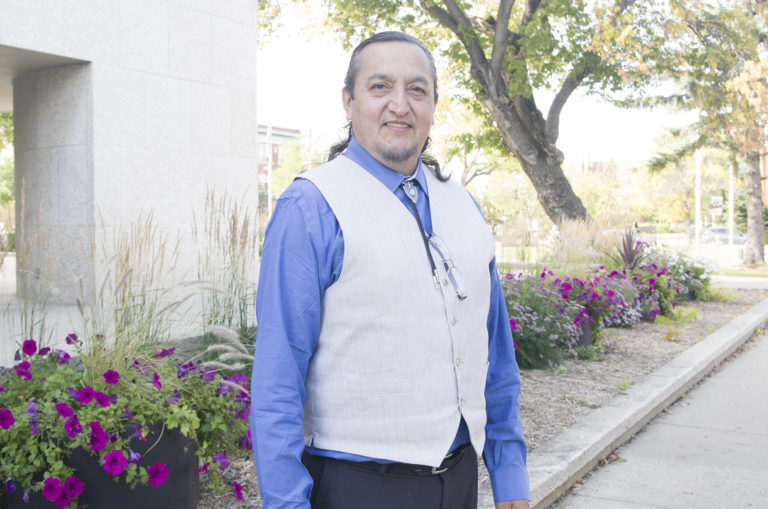
Education has defined Brian Littlepine’s life.
After leaving his home community of Beardy’s and Okemasis First Nation in 1980, Littlepine attended the University of Saskatchewan and graduated with an education degree. He married a special education teacher, went back for a post-graduate degree, had three daughters, two of which are in the process of earning degrees in psychology and nursing (the other has already graduated and lives overseas), and spent his entire career as a teacher and administrator, mainly for the Prince Albert Grand Council.
Proper education is one of the most biggest ways to help people get ahead, he says, and it’s the biggest reason he’s decided to run in the 2019 federal election.
“For Prince Albert, one of the biggest issues that I always see, even in comments on Facebook, is the poverty that exists in the whole area,” he explains. “How I think we should address it is through education and training.”
“The way I see it, Prince Albert is the bottleneck between the south and the north. Everybody comes through here, more or less,” he continues. “With the increase in poverty in the north, people tend to come this way.”
Poverty and education are not new issues, but Littlepine’s preferred party is. He’s running for the Veterans Coalition Party of Canada, which, despite the name, includes both veterans and civilians in its membership base.
The party only became official last August, with Nova Scotian Randy Joy as their leader, and has more than 70 candidates running across Canada.
Littlepine joined the party after connecting with them on Facebook. He was concerned there was too much money in Canadian politics, and that politicians cared more about their donors than the average voter. The VCP, he says, was created to fill that void.
“We’re not financed by anybody,” he says during an interview on Sept. 14. “Everybody’s doing this on their own, more or less, so we’re not controlled by anybody. What I think we’re trying to do is just address the needs of regular Canadians.”
For Littlepine, that starts with education and job training. He wants to see more money put into the schools, especially those in First Nations communities.
A 2013 report showed that education funding for children living on reserve was at least 30 per cent lower than for those off reserve. The federal Liberal government tried to alleviate that problem by promising an additional $2.6-billion over five years for First Nations elementary and secondary education, but Littlepine says those funds have yet to materialize.
Indigenous leaders like FSIN Chief Bobby Cameron have also criticized the government for taking too long to provide the funding.
“Everybody was just excited and everybody was just planning, and, ‘okay, we can do this, we can do that,’” remembers Littlepine, who was working as an administrator when Federal funding was announced. “Then all of a sudden we waited, waited and just nothing happened at all. We never got the increase.”
Education is Littlepine’s biggest concern, but it’s not his only one. He’s worried too many seniors are struggling to pay all their bills, and says the Veterans Coalition Party can help them.
If elected, the party promises to lower the optional age to begin receiving Canadian Pension Plan (CPP) benefits to 55, along with other changes.
“When people get older, they should be enjoying life, not having to worry about what they are going to eat, (or) are they going to have money for their heat in the winter,” he says.
Littlepine added that he’s wants the federal government to help fund a second bridge in Prince Albert, and support the construction of more pipelines in Western Canada, since it’s a safe way to transport oil, provided they’re built and monitored properly.
“Some companies are too aggressive with their construction, and that’s when accidents happen, but we are supportive of pipelines,” he says. “It’s increasing the economy for all of Canada.”
Other party policies include plans to lower the GST by 1.25 per cent per year until it’s eliminated, repeal all carbon taxes, mandate that all fossil fuel producers develop new green technology, place a hiring freeze on the civil service, a two-year moratorium on immigration, provide pensions and mental health supports for residential school survivors, and reduce the pay and office expense accounts for all MPs by 20 per cent. That last promise will be filled immediately after the election.
The party also plans to place a four-year moratorium on international aid spending. Those funds will instead go homeless and affordable housing programs, and changes to the CPP.
Littlepine is one of six candidates running in the 2019 Federal Election. He’s up against Kelly Day (PPC), Miranda Friske (Green Party) Estelle Hjertaas (Liberal), incumbent MP Randy Hoback (Conservative), and Harmony Johnson-Harder (NDP).
Election Day is Oct. 21.
